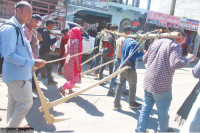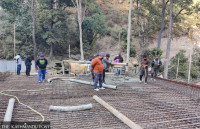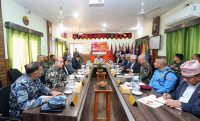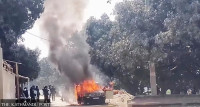National
Eight injured, two critically, in a blast at a government office in Siraha
The explosion, for which Jaya Krishna Goit-led faction has taken responsibility, shows radical forces continue to exist and they should be brought to the talks table, analysts say.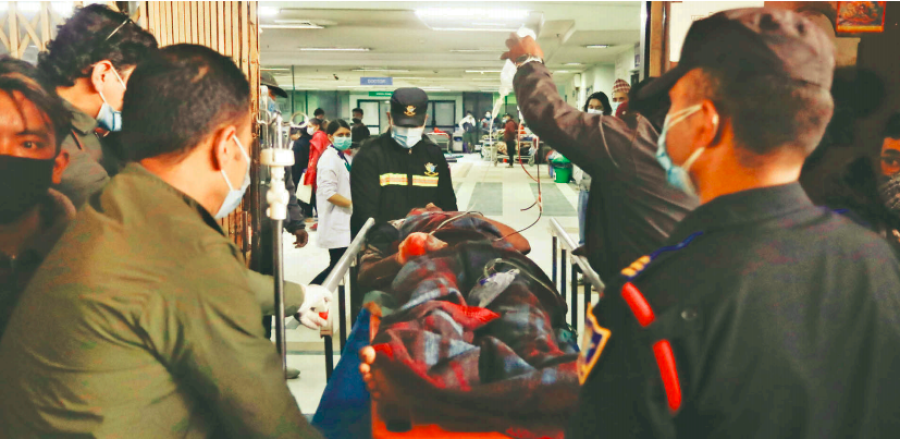
Bharat Jargha Magar & Tika R Pradhan
A blast at a government office on Sunday injuring eight persons has raised questions over Prime Minister KP Sharma Oli’s claim that politics of violence has ended in the country.
Two government employees and six service seekers were injured when an improvised explosive device (IED) went off at the Land Revenue Office in Lahan Municipality, Siraha, on Sunday. The condition of two of the injured is said to be critical.
Dinesh Bhandari, a service seeker from Dhangadhimai Municipality, Siraha, was airlifted to Kathmandu for further treatment while Shiva Kumar Yadav, a non-gazetted first class officer at the office near whose desk the “pressure cooker bomb” went off, was rushed to Biratnagar, according to Deputy Superintendent Tapan Dahal.
According to Krishna Kumar Niraula, assistant chief district officer, the explosive device, planted on the first floor of the rented office building, went off at around 12:47pm.
The other injured include Bhola Bahadur Magar, a paralegal officer, and service seekers Laxmi Rana, Lal Bahadur Bishwakarma, Phul Kumari Thakur and Badri Narayan Yadav. They are receiving treatment at Lahan Hospital and are out of danger, said Dahal.
The Jaya Krishna Goit faction of the Janatantrik Tarai Mukti Morcha (Revolutionary) has claimed responsibility for the blast.
Issuing a statement later on Sunday, the armed Tarai outfit owned up to the incident. The outfit said it detonated the explosive at the government office as a symbol of protest against corruption and criminal activities that are rife in Madhes.
The Goit faction of Janatantrik Tarai Mukti Morcha (Revolutionary) is notorious for its violent activities in the past as well. The outfit had detonated explosives at Bikash Traders in the downtown of Lahan in March 2018. Eight people, including a seven-year-old child, had sustained injuries in the incident. The group was also involved in five similar explosions in the district in 2017 and 2018 that left scores of people injured. Security personnel had recovered some pamphlets of the outfit that demanded ‘independent Tarai’.
Sunday’s blast took place at a time when the Land Revenue Office is usually crowded with service seekers.
Bishwakarma, who was at the office to inquire about his land, sustained shrapnel injuries on his back.
“I heard a big noise and the next thing I remember is waking up at the hospital bed,” Bishwakarma told the Post.
Documents, computers and furniture were destroyed in the blast.
According to Dipendra Prasad Chaudhary, the chief at the office, data and information of the public are safe in digital format.
The incident site is about 100 metres from the Area Police Office, Lahan.
“An investigation is underway. The culprits involved in the blast will be detained soon,” said Dahal.
The blast on Sunday comes days after the Communist Party of Nepal led by Netra Bikram Chand, which was said to be the last of the armed outfits in Nepal, joined mainstream politics after signing a three-point agreement with the government.
Chand made his first public appearance in Kathmandu, alongside Prime Minister Oli, on March 5, a day after his party agreed to shun politics of violence and seek to get its demands addressed through peaceful activities.
The Chand party, which was formed in 2014, had carried out two blasts in the Capital in February and March 2019 in which one person was killed and another injured.
After bringing the Chand party to peaceful politics, exactly a year after making CK Raut, who was carrying out a secessionist movement in the Tarai, join mainstream politics, Oli had declared that there were no more armed outfits and that complete peace had returned to the country.
Vijay Kant Karna, a professor of political science at Tribhuvan University, said Sunday’s blast after many years of silence has surprised many.
“It looks like Goit wants to draw the government’s attention… he must have thought he would not be invited for talks if he did not take violent means,” Karna told the Post. “After Netra Bikram Chand’s entry into peaceful politics, Goit must have been trying to draw the government’s attention as he too has been waiting to be invited to the talks table.”
Goit formed the Janatantrik Tarai Mukti Morcha in 2004 after splitting from the Communist Party of Nepal (Maoist). Goit was formerly a leader of the CPN-UML. He was the coordinator of the Madhesi Liberation Front under the Communist Party of Nepal (Maoist) when the Maoist armed insurgency was going on. He later decided to part ways with the Maoist party, charging the Maoist leadership with betraying the Madhesi people, and formed his own outfit.
Karna said there should be no room for politics of violence in the country and called on the government to initiate talks with such outfits as the one led by Goit.
According to Karna, Goit is not a well-organised force to create a big trouble but such sporadic violent activities could create a space for the disgruntled lot when the country’s politics is fluid.
“This sudden attack has drawn the attention of many people,” said Karna. “It shows that radical politics in Madhes is not yet over.”
The 2015 constitution, which was promulgated despite opposition from various sections, and subsequent elections in 2017 had ushered in a semblance of peace and stability in the country. But Oli’s sudden House dissolution on December 20 threw the country into uncertainties. The Supreme Court decision on February 23 to revive the House injected some hope that politics would return to Parliament. But on March 7, the Supreme Court’s verdict to revive the CPN-UML and the Maoist Centre added to the confusion.
Amid the political uncertainty, such violent activities could bode ill for the country, according to Karna.
“The Maoists benefited a lot because the parliamentary parties were busy in horse trading,” Karna said. “The country now is seeing unstable politics and radical forces could get a chance to rear their heads.”
Chandrakishore, a journalist who has closely followed national and Madhes politics, condemned the blast perpetrated by the Goit group and said that such violent activities don’t help anyone, not even those who these outfits claim to be fighting for.
“Such activities must be discouraged,” Chandrakishore told the Post. “This time, poor service seekers were also the victims. More often, Madhesi people have become victims of such violent politics. Such activities are unacceptable.”




 9.17°C Kathmandu
9.17°C Kathmandu

